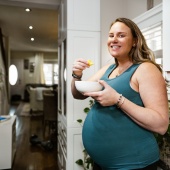Every pregnant woman or person is offered screening, including scans and blood tests, during pregnancy. In this article, we explain when they are offered and what they are for.
Pregnancy screening is offered by the NHS. This can identify health conditions that may affect the mother or birthing parent or the baby (NHS, 2021a).
This allows parents time to make decisions about their health. Any treatment can be provided earlier and might be more effective (NHS, 2021a).
Occasionally, some people may be told they have a chance of a health condition when they do not. Sometimes they will have a health condition which isn’t identified (NHS, 2021a).
Private companies also offer screening, but this is paid for by parents (NHS, 2021a).
What types of screening are offered during pregnancy?
The NHS offers screening at different stages of pregnancy. These will be (NHS, 2021a):
- Ultrasound scans
- Blood tests
All screening and tests are optional (NHS, 2021a).
Other screening, including urine tests and blood pressure checks, are offered at every appointment (NHS, 2023a). The mother or birthing person will also be offered a test for iron deficiency anaemia. A test for gestational diabetes is offered to those considered at higher risk (NHS, 2023a).
A carbon monoxide test will be offered at the booking appointment and 36 weeks. If the mother or pregnant person smokes or has ever smoked, it will be offered at every appointment (NICE, 2021a).
The mother or pregnant person will be invited to provide their height and weight to calculate their Body Mass Index (BMI) (NHS, 2023a). However, this calculation is not a useful measurement for some people. It does not take into account muscle mass, sex or ethnicity (Bays et al, 2022).
See the table below for the full list of tests and when they are offered. Anyone who has missed screening or tests for any reason could ask the midwife about their options.
| When | What | Note |
|---|---|---|
| As early as possible, ideally before 10 weeks |
Blood screening for infectious diseases is offered to everyone: HIV, hepatitis B, syphilis.
|
These are blood tests done early in pregnancy to allow time for further tests, decisions, and appropriate care. Will confirm if parent is a carrier. Further checks are needed to check if the baby is affected. All blood tests are opt in. |
| As early as possible |
Screening for inherited conditions: Sickle cell and thalassaemia. Offered to specific populations and you can also request them. |
As above. |
| Booking appointment, ideally before 10 weeks |
|
Urine and blood pressure will be checked at every antenatal appointment. |
| After booking appointment | Oral glucose tolerance test (OGTT) for gestational diabetes | Only if had gestational diabetes in a previous pregnancy. |
| 10-14 weeks |
Dating scan / 12 week ultrasound scan |
Scans are done in hospital. NT scan only if you have chosen screening for genetic conditions. |
| 10-14 weeks |
Screening for genetic conditions: Down syndrome, Edwards' syndrome, Patau's syndrome CVS can be done from 11 weeks |
If screening for genetic conditions, blood tests are taken around time of dating scan. |
| 14-20 weeks |
|
Blood test for Down syndrome if NT scan wasn't possible. Diagnostic test offered to those with a higher chance of a genetic condition. |
| 18-21 weeks | Development (Anomaly) scan / 20 week scan screens for physical conditions in the baby and genetic conditions if requested. | Checks for 11 conditions, including Edward's and Patau's syndrome if NT scan wasn't possible. |
| 24-28 weeks | Oral glucose tolerance test (OGTT) for gestational diabetes | Only if risk factors present. |
| 28 weeks | Anaemia | Repeat blood test |
| 36 weeks | Carbon monoxide testing |
(Gov.uk, 2025a; Gov.uk, 2025b; Gov.uk, 2025c; NICE, 2021a; NICE, 2021b; NHS, 2023a; NHS, 2023b; NHS, 2021a; NHS, 2021b)
Additional scans or tests might be offered for some pregnancies. For tests after the baby is born, see our separate article.
What are ultrasound scans and when are they offered?
Ultrasound scans use waves that pass through the belly to build a picture of the baby in the womb. They are safe and won’t hurt the parent or baby. It remains the mother or pregnant person’s choice to accept or decline the scan (NHS, 2023b).
They are offered to everyone at:
- 10-14 weeks
- 18-21 weeks
The first scan is called the 12-week scan, and the second is called the 20-week scan.
The scans usually take about 20-30 minutes, but you need to allow longer for waiting or if you're asked to drink water to give a better ultrasound image. Another adult can go along to watch the scans, but children are generally not allowed (NHS, 2023c).
The pregnant woman or parent is often advised to have a full bladder for scans. It can make the ultrasound image easier to see (NHS, 2023c).
What is the 12-week scan for?
The 12-week scan is called the ‘dating’ scan, and is arranged by the doctor or midwife. This will usually take place at the local hospital’s ultrasound department (NHS, 2023c).
Measuring the baby’s size at the scan gives an idea of how many weeks along the pregnancy is. The estimated due date might be adjusted based on this information (NHS, 2023c).
Other things the scan checks for (NHS, 2023c):
- How many babies there are
- The position of the placenta
- The development of the baby or babies
- If the baby is showing signs of a health condition
The results of the scan are usually shared immediately (NHS, 2023b).
If the Nuchal Translucency scan was requested then the results for Down, Edward’s and Patau’s syndrome will be sent by letter after the scan. Ask the midwife how long it takes to hear back in your area (NHS, 2021b).
Measuring the baby’s growth is particularly important in the case of twins, or if there has been a problem in this or a previous pregnancy (NHS, 2023b).
Finding out the sex of the baby isn’t offered at the 12-week scan, but might be at the 20-week scan. However, some hospitals have a policy not to reveal the sex (NHS, 2023b). Bear in mind that occasionally, results are not accurate and parents might be told the wrong sex.
What is the 20-week scan for?
It’s up to the mother or birthing parent if they want a 20-week scan (NHS, 2024).
At the scan, the placenta and blood flow are checked. Also, the baby will be checked for signs of 11 conditions, including (NHS, 2024):
- spina bifida
- cleft lip and palate
- If genetic tests are requested, Patau’s syndrome and Edward’s syndrome
The parent will be told the results when the sonographer (the person doing the scan) has finished all the checks (NHS, 2024). For genetic conditions the results may be sent by letter and take a little longer – ask the midwife or sonographer (NHS, 2021b).
What happens if the baby has signs of a condition at the scan?
Most people will be told their baby doesn’t have signs of a condition. If there are concerns, more scans and diagnostic tests might be offered (NHS, 2024).
What are the risks of screening?
There aren’t any risks to screening, but depending on what is found it can affect birth plans and lead to difficult decisions (NHS, 2021a). For that reason, some people decide to decline screening.
The next step might be a diagnostic test.
What are diagnostic tests?
Diagnostic tests confirm if a genetic condition is present. These are Down, Edward's or Patau's syndromes. Antenatal diagnostic tests have a very small chance of miscarriage. Diagnostic tests are ( NHS, 2021a):
- Chorionic villus sampling (kor-ree-on-ic vill-us) or CVS
- Amniocentesis (am-nee-o-sen-tee-sis), where a sample of amniotic fluid is taken with a needle to test
Parents decide what to do if a condition is found. Healthcare professionals should support them in their decision (NHS, 2021a).
Which screening or tests do I have to have?
You don’t have to accept any screening or tests (NHS, 2021a).
It should be explained to you that some tests would lead to urgent treatment for serious conditions (NHS, 2021a):
- Eye screening if you have diabetes already (not gestational diabetes)
- Blood tests for infectious diseases which could affect the baby
- Newborn screening tests, including a hearing test and blood spot screening
It’s worth knowing that screening and diagnostic test records will only be shared with staff who need to see them (NHS, 2021).
Where to get further information and support
Antenatal results and choices (ARC) provides information and support around making decisions before or after screening and tests.
The government has a website with information on screening tests for you and your baby.
Support organisations include:
Bays HE, Gonsahn-Bollie S, Younglove C, Wharton S (2022) Obesity Pillars Roundtable: Body mass index and body composition in Black and Female individuals. Race-relevant or racist? Sex-relevant or sexist?, Obesity Pillars, 4, 100044. https://doi.org/10.1016/j.obpill.2022.100044
Gov.uk (2025a) Infectious diseases. https://www.gov.uk/government/publications/screening-tests-for-you-and-… [3 Jun 25]
Gov.uk (2025b) Sickle cell and thalassaemia. https://www.gov.uk/government/publications/screening-tests-for-you-and-… [3 Jun 25]
Gov.uk (2025c) Screening in pregnancy: CVS and Amniocentesis information for parents. https://www.gov.uk/government/publications/cvs-and-amniocentesis-diagno… [22 Apr 25]
NHS (2021a) Screening tests in pregnancy. https://www.nhs.uk/pregnancy/your-pregnancy-care/screening-tests/ [22 Apr 25]
NHS (2021b) Screening for Down’s syndrome, Edwards’ syndrome and Patau’s syndrome. https://www.nhs.uk/pregnancy/your-pregnancy-care/screening-for-downs-ed… [22 Apr 25]
NHS (2023a) Antenatal checks and tests. https://www.nhs.uk/pregnancy/your-pregnancy-care/antenatal-checks-and-t… [22 Apr 25]
NHS (2023b) Ultrasound scans in pregnancy. https://www.nhs.uk/pregnancy/your-pregnancy-care/ultrasound-scans/ [22 Apr 25]
NHS (2023c) 12 -week scan. https://www.nhs.uk/pregnancy/your-pregnancy-care/12-week-scan/ [22 Apr 25]
NHS (2024) 20- week screening scan. https://www.nhs.uk/pregnancy/your-pregnancy-care/20-week-scan/ [22 Apr 25]
NICE (2021a) Tobacco: preventing uptake, promoting quitting and treating dependence [NG209] https://www.nice.org.uk/guidance/ng209/chapter/Treating-tobacco-depende… [22 Apr 25]
NICE (2021b) Antenatal care [NG201] https://www.nice.org.uk/guidance/ng201 [3 Jun 25]








